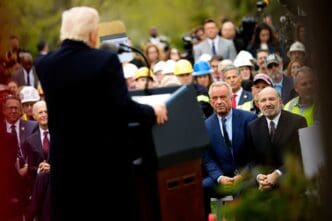WASHINGTON – President Donald Trump on Tuesday threatened to impose tariffs of up to 250 percent on imported pharmaceuticals, the highest and most specific rate he has discussed to date in his escalating campaign to force the drug manufacturing industry back onto American soil.
The president, speaking on CNBC’s “Squawk Box,” outlined a phased-in approach that would start with a small initial tariff before dramatically ramping up over the next 18 months.
“We’ll be putting a, initially small tariff on pharmaceuticals,” Trump said. “But in one year, one and a half years maximum, it’s going to go to 150 percent, and then it’s going to go to 250 percent, because we want pharmaceuticals made in our country.”
The threat is the latest and most severe in a series of similar pronouncements from the White House, which has repeatedly pledged to impose steep tariffs on the industry only to later back off. Just last month, the president had floated a potential tariff of up to 200 percent. This new, higher figure signals a hardening of the administration’s stance as it seeks to use its trade policy to achieve its goal of onshoring critical supply chains.
The pharmaceutical industry has warned that it is bracing for chaos if the president follows through on his threats. Industry leaders say that such massive tariffs would severely disrupt complex international supply chains, forcing companies to decide whether to absorb the immense costs or pass them on to patients in the form of higher drug prices. They also warn that the move could exacerbate existing drug shortages in the United States.
The administration’s push is rooted in a national security argument. In April, the White House launched a formal investigation into the effects of importing pharmaceuticals on national security, a move that provides the legal justification for imposing tariffs. The stated goal is to reduce America’s reliance on foreign countries, particularly China, for essential medicines.
While the administration wants more drug companies to onshore their manufacturing, experts caution that such a process would be a complex and years-long endeavor, while the economic pain from the tariffs would be much more immediate for both companies and consumers.
Even before Tuesday’s announcement, the administration’s persistent threats have already spurred a wave of massive investment in domestic manufacturing from major drug companies. In recent months, AstraZeneca announced it will spend $50 billion to expand its drug manufacturing in the U.S., Johnson & Johnson said it is investing $55 billion into U.S.-based research and development, and Eli Lilly revealed it will spend $27 billion to build four new manufacturing plants in the United States.
The president’s latest threat now raises the stakes even higher, creating a new level of uncertainty for a global industry at the center of his “America First” economic agenda.








